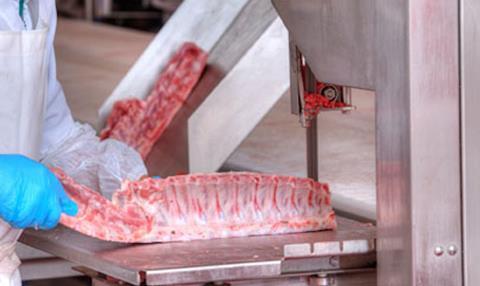The Scottish Association of Meat Wholesalers (SAMW) is seeking greater support from government on several issues, including an alternative visa solution for recruiting EU workers.

The association has said that, while acknowledging that Covid-19 created a massive ‘beyond control’ challenge for the government in 2021, member companies were “badly served by Westminster over the past 12 months as regards a range of pertinent issues.”
SAMW said that the lack of a workable and practicable visa scheme, through which to recruit skilled staff from EU countries, coupled with ever rising costs from all directions, has placed Scotland’s red meat sector in “an extremely challenging position” ahead of 2022.
Alan McNaughton, SAMW president, said that maintaining a workforce at a level that keeps the Scottish meat industry viable has been the “overwhelming concern” for members throughout the year. McNaughton said businesses “have been left on their own to fight a lone battle to find skilled workers.”
McNaughton went onto criticise the emergency visa arrangements that were put in place in October this year, stating that the temporary solution hasn’t delivered “to any significant degree” in the two months since its introduction. Without a long-term solution that addresses the underlying issues of the workforce shortages, McNaughton said, the industry will continue to see labour supply problems in 2022.
He added that wage rates, energy bills, compliance costs and the price of raw materials are all on the rise, with the cost burden on SAMW members becoming “unsustainably high.” McNaughton said: “A market correction is looming which may well mean that an explosion of costs and prices at the retail level will be inevitable at some point in 2022 with processors, wholesalers and retailers being forced to apply cost increases to their end products.”
Scottish pig sector
SAMW are also looking for further support from government to tackle ongoing supply and trading issues within the Scottish pig sector. The ongoing shortage of butchers, unshifting backlogs on farms and the loss of export licences to China are all of concern to the association.
The group has reported that small, niche product businesses within the Scottish red meat industry have had to give up on trading opportunities due to complications in trading with the EU. SAMW added: “If ministers are serious about boosting our export volumes, then a helping hand to provide a low-cost route to Europe and beyond is urgently required.”
Financial reimbursement sought
The association has also raised its concern about the campaign to restore Scotland’s BSE status to negligible risk (NR). The NR status was lost in October 2018 following a single BSE case in northeast Scotland. This has cost SAMW members around £90 million in lost revenue to date. SAMW is campaigning for this sum to be restored to the industry in 2022.
SAMW is also requesting some financial support from the Scottish government towards extra costs incurred by the mandatory requirement for members to install CCTV cameras in abattoirs. Writing to the Cabinet Secretary, SAMW outlined the disparity between funding given to island plants and that afforded to mainstream processing businesses to cover these costs.
According to the association, red meat processors face full-cost recovery for official controls, as delivered by Food Standards Scotland (FSS), while other food sectors, such as fish processing, enjoy the free provision of similar controls. McNaughton explained that compliance costs experienced by abattoirs has been a “major factor” for the reduced number of businesses operating today.
Education must continue
SAMW welcomed the opportunities supplied by COP26 in Glasgow to enable the industry to promote the benefits of Scotland’s red meat production to a global audience. McNaughton added: “It allowed us to distance ourselves from the intensive feedlot image on which so much negative anti-meat publicity is based.
“Educating the consumer on our environmentally friendly production systems must continue if we are to ensure our product is marketed to maximum advantage.”
This story was originally published on a previous version of the Meat Management website and so there may be some missing images and formatting issues.












